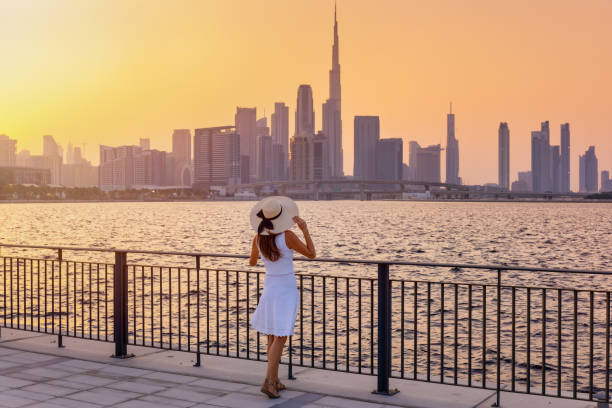Your Complete Guide to the Dubai Residence Visa Application Process
Navigating the Dubai residence visa application process can seem overwhelming due to various requirements, types of visas, and bureaucratic steps involved. However, with a clear understanding of each stage, applicants can effectively move through the system and secure their desired visa. The residence visa is crucial for anyone looking to establish a permanent or long-term presence in Dubai, which is known for its vibrant economy and diverse culture.
How to get residence visa in Dubai

What is a Dubai Residence Visa?
A Dubai residence visa allows foreigners to live legally in the UAE for an extended period. This visa is necessary for expatriates who wish to work, study, or settle in Dubai. It serves as legal documentation confirming an individual’s residency status and is required for various essential activities such as opening bank accounts, renting property, and accessing healthcare services. As Dubai continues to grow as a global business hub, obtaining a residence visa has become increasingly popular among foreign nationals seeking new opportunities.
Types of Dubai Residence Visas
There are several types of Dubai residence visas to accommodate different circumstances, including:
- Employment Visa: Typically sponsored by an employer for individuals who secure job positions in Dubai.
- Investor Visa: Designed for individuals or investors who establish or invest in a business in Dubai.
- Family Sponsorship Visa: Allows expatriates to sponsor their family members to join them in Dubai, such as spouses and children.
- Student Visa: For individuals who enroll in an accredited educational institution in Dubai.
These various visa categories cater to the diverse needs of applicants, ensuring that everyone from employees to investors can find a suitable visa option.
Eligibility Criteria for Dubai Residence Visa

Basic Requirements for Applicants
Before applying for a residence visa, it’s imperative to understand the basic eligibility criteria set by the UAE government. The general requirements include:
- Age: Applicants must be at least 21 years old, as specified by UAE immigration laws.
- Health: A health screening, including tests for communicable diseases, is mandatory.
- Financial Stability: Applicants must demonstrate sufficient financial means to support themselves and any dependents if they are applying for a family sponsorship visa.
These prerequisites ensure that applicants are well-prepared to contribute positively to society and abide by local laws.
Specific Requirements for Different Visa Types
In addition to the basic requirements, each type of residence visa has its own specific eligibility criteria. For example:
- Employment Visa: Requires a job offer from a reputable organization and sponsorship from the employer, along with necessary qualifications and experience credentials.
- Investor Visa: Applicants must invest a minimum amount in a UAE-based company or property, with detailed documentation to substantiate the investment.
- Family Sponsorship Visa: The sponsor must have a valid UAE residence visa and meet minimum salary requirements to support their family members.
Understanding these specific requirements is crucial for applicants to ensure that they provide the right documentation and meet all eligibility conditions.
The Application Process

Step-by-Step Guide to Apply for a Residence Visa
The application process for a Dubai residence visa consists of several key steps that must be followed meticulously:
- Gather Required Documents: Compile all necessary documents based on the type of visa you are applying for.
- Submit Application: Applications can typically be submitted through the General Directorate of Residency and Foreigners Affairs (GDRFA) or authorized centers.
- Pay Fees: Fees vary based on the type of visa; ensure payment is made correctly to avoid delays.
- Wait for Processing: After submission, wait for a response regarding approval or further documentation requests.
- Complete Medical Tests: Once approved, complete the mandatory medical and health screenings.
- Receive Visa: Upon passing health inspections, the residence visa will be issued.
Common Documents Required for Application
When applying for a residence visa in Dubai, several critical documents are required:
| Document | Description |
|---|---|
| Passport copy | A clear copy of your valid passport with at least six months remaining validity. |
| Photos | Recent passport-sized photographs adhering to UAE regulations. |
| Employment or sponsorship letter | A letter from your employer or sponsor confirming the purpose of your stay. |
| Medical certificate | A report proving that you have passed medical tests conducted by approved centers. |
| Proof of financial capability | Documents demonstrating your financial stability, such as bank statements or salary certificates. |
Ensuring that all necessary documents are prepared can significantly ease the application process and prevent potential delays.
Processing Time and Fees
The processing time for a Dubai residence visa can vary based on several factors, including the type of visa being applied for and the applicant’s nationality. Generally, the process can take anywhere from a few days to several weeks. For instance, employment visas may be processed relatively quickly if all documentation is in order, while family sponsorship visas could experience longer processing times due to additional verification. It’s also essential to factor in potential delays that may arise from incomplete applications or missing documents. Moreover, the time of year can impact processing; during peak periods, such as before major holidays, the processing may slow down. To help streamline the application, applicants should ensure their submissions are comprehensive and follow the guidelines provided by the General Directorate of Residency and Foreigners Affairs (GDRFA).
Regarding fees, the costs associated with obtaining a Dubai residence visa can vary significantly depending on the visa category and the applicant’s circumstances. Basic fees typically include application fees, medical examination costs, and attestation charges for required documents. It’s advisable to check the latest fee schedule published by the GDRFA for specific amounts, as these fees may be revised periodically. Additionally, applicants may also incur extra costs if they require professional assistance for their application. Transparency regarding the fees upfront can help individuals budget effectively and avoid surprises later in the process. It’s worth noting that not all fees can be paid online; some may require in-person payment at designated centers.
Post-Application Procedures
What to Expect After Submission
Once the application for a Dubai residence visa has been submitted, applicants enter an anxious waiting period. During this stage, applicants should be prepared for potential communication from the authorities. The GDRFA may reach out to request additional documentation or clarification on submitted information if needed. Some applicants might also be required to attend an interview depending on their visa type, especially in cases where clarifications on sponsorship or the employment offer need to be made.
It’s also essential to stay proactive during this stage; if the processing time exceeds the standard duration, reaching out to the GDRFA to inquire about the application status can be helpful. Moreover, individuals should follow up on their health examination results, as this independently conducted screening is a crucial step in the approval process. Being prepared for this phase can ease anxiety and ensure applicants can promptly address any concerns that may arise. Timely follow-ups also signal to the authorities that the applicant is genuinely interested in securing their residency.
Renewal and Cancellation of Residence Visa
Once approved, the Dubai residence visa is typically valid for 2 to 3 years but will require renewal before expiration. Applicants should be aware that starting the renewal process at least 30 days before the visa’s expiry date is advisable to avoid any legal complications or fines. The renewal process often mirrors the initial application process, requiring the same documentation, including a medical certificate, recent photographs, and proof of ongoing employment or sponsorship. Applicants should ensure that all documents are current and comply with the regulations specified by UAE immigration authorities.
In some cases, holders of residence visas may need to cancel their visas due to job changes or for personal reasons. It’s vital to follow the proper cancellation procedures, as failing to do so may result in fines or legal complications. The cancellation process typically involves submitting a cancellation request through the employer or sponsor if applicable. An exit clearance may also be necessary if the individual is planning to leave the UAE. Keeping records of all communications related to the visa status will help ensure a smoother cancellation process. Ultimately, maintaining awareness of visa status and following the necessary steps will allow individuals to navigate their residency effectively.
Conclusion
Navigating the Dubai residence visa application process may seem daunting at first, but with a clear understanding of the requirements and procedures, applicants can streamline their journey. By knowing the different visa types, eligibility criteria, application steps, and post-application processes, individuals can effectively manage their application and enjoy living and working in Dubai. It’s crucial to be organized, understand the necessary documentation, and adhere to the stipulated timelines to prevent delays. In addition, remaining aware of potential challenges and common pitfalls can prepare applicants better for their journey ahead. Remember, preparedness is key, and being equipped with the necessary information will make your experience much smoother.
FAQs
1. How long is the Dubai residence visa valid?
The Dubai residence visa is typically valid for 2 to 3 years, depending on the type of visa and specific conditions attached to it. It’s essential to check the visa details upon issuance for the exact expiration date.
2. Can I convert my tourist visa to a residence visa?
Yes, in certain circumstances, it is possible to convert your tourist visa to a residence visa, provided you meet the necessary eligibility criteria and apply through the proper channels.
3. Is it necessary to have a sponsor to apply for a residence visa?
Yes, most residence visas require a sponsor, which can be an employer, a family member, or a partner, depending on the type of visa you are applying for. The sponsor is responsible for specific obligations related to the visa holder’s residency.
4. What happens if my residence visa expires?
If your residence visa expires, you may face fines and legal complications. It’s essential to renew your visa before the expiration date to avoid these issues, including fines that accumulate for each day post-expiration.
5. Can I work with a residence visa issued by a family member?
Yes, if your residence visa is issued under family sponsorship, you will generally still need an additional work permit to engage in employment activities legally. Ensure that you follow the proper steps to obtain the necessary work authorization based on your situation.


